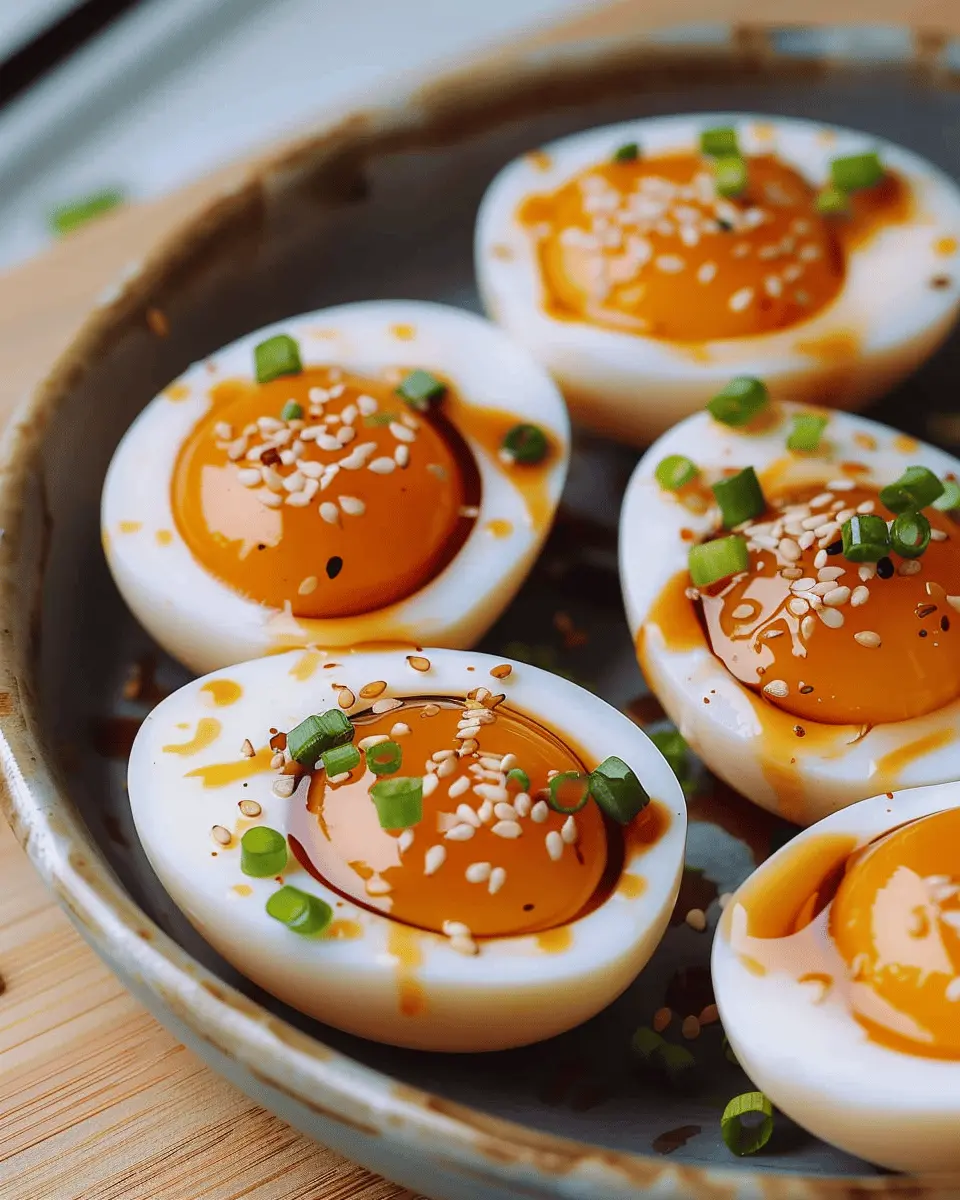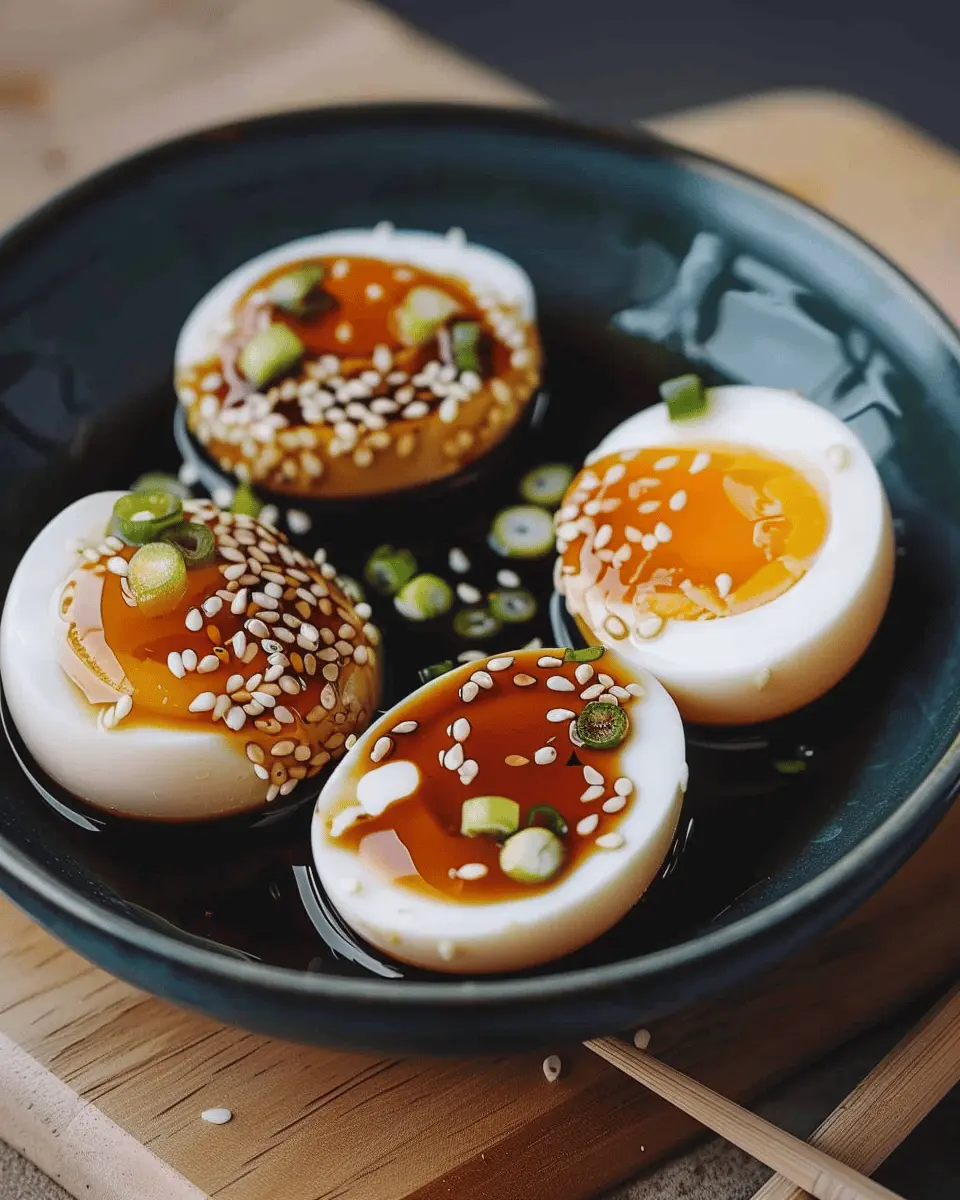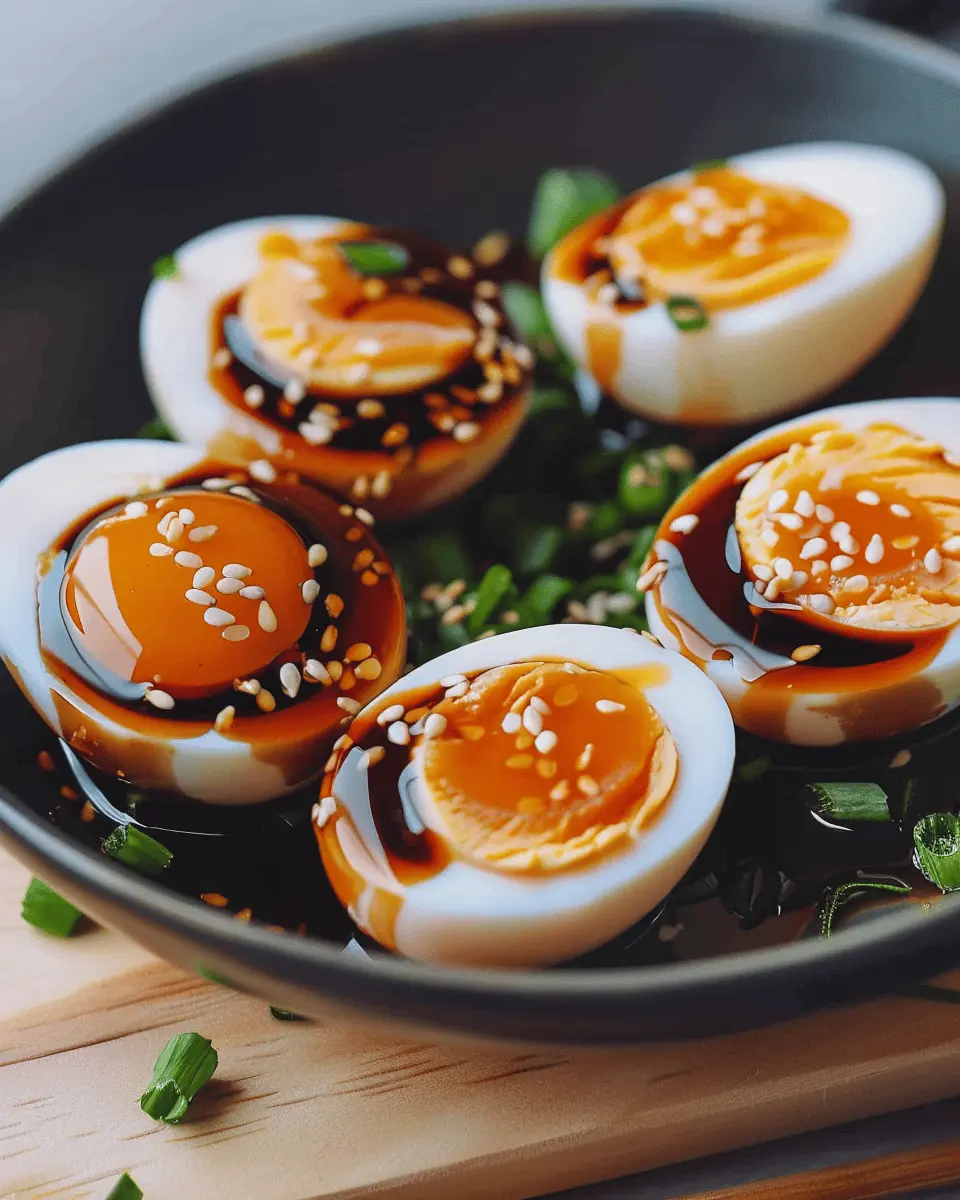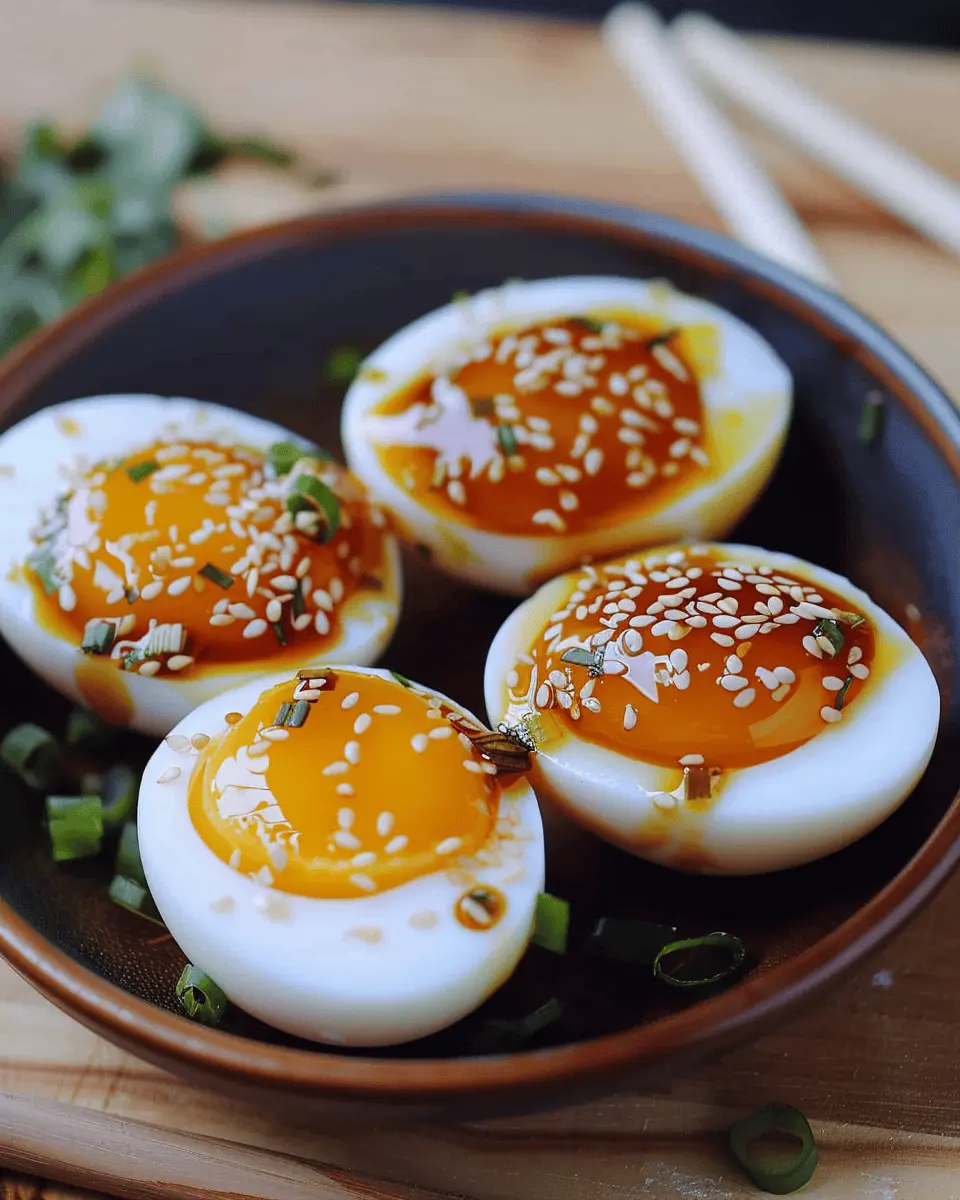Introduction to Soy Sauce Eggs
If you’re looking for a delightful snack or a unique twist to your meal prep, soy sauce eggs are a must-try. This simple yet flavorful dish consists of hard-boiled eggs that soak in a rich soy sauce marinade, resulting in a vibrant and savory treat that elevates any dining experience. Whether enjoyed on their own, as a topping for rice bowls, or as an add-on to salads, these eggs are flavorful little gems that can bring excitement to your plate.
What makes soy sauce eggs a must-try dish?
One of the best things about soy sauce eggs is how versatile they are. They not only carry a savory punch but also infuse a rich umami flavor that perfectly complements various dishes. Ever felt like your meal needed just a little something extra? Adding these eggs can turn an ordinary dish into an extraordinary one. Plus, they are great for meal prep, allowing you to whip up a batch at the beginning of the week for an easy snack or garnish later on.
The beauty of this dish doesn’t stop at flavor. With a simple ingredient list—just eggs, soy sauce, and some optional aromatics—you can create something truly delicious without breaking the bank. Furthermore, eggs are a fantastic protein source and make for a filling snack that keeps your energy levels up throughout the day, especially for busy young professionals. You can read more about the health benefits of eggs from experts at the American Egg Board.
Making soy sauce eggs is also a fun activity. It’s one of those recipes that feels almost meditative, as you walk through the steps of boiling and marinating. Plus, you can get creative with different marinades—consider adding spices or fresh herbs to customize the flavor.
Incorporating soy sauce eggs into your kitchen routine opens doors to exploring traditional Asian flavors, making it a perfect dish to share at gatherings. So, are you ready to dive in and transform your meals with this delightful recipe? Stick around; you’re about to find out just how easy it is to make these delectable eggs!

Ingredients for Soy Sauce Eggs
When you dive into making soy sauce eggs, it’s all about quality ingredients that pack a punch of flavor. Here’s what you will need to get started:
-
Eggs: Start with large, fresh eggs. Organic or free-range varieties add depth to the flavor and ensure a rich yolk.
-
Soy Sauce: Choose a good-quality soy sauce. Dark soy sauce will impart a deeper color and richer flavor, while light soy sauce offers a subtler taste.
-
Mirin or Rice Vinegar: If you prefer a bit of sweetness, mirin is your friend. Alternatively, rice vinegar can provide a gentle tang that balances the saltiness of the soy sauce.
-
Sugar: Adding a touch of sugar (white or brown) helps to balance the saltiness and enhances the overall taste of the soy sauce eggs.
-
Optional Additions: Feel free to toss in ingredients like garlic, ginger, green onions, or sesame oil for a flavorful twist!
By carefully selecting these ingredients, you set the stage not just for soy sauce eggs, but for a dish that makes the average meal feel special. Want to explore more about soy sauce? Check out this guide for extra insights!
Preparing Soy Sauce Eggs
Making soy sauce eggs is a delightful and rewarding process that results in a flavorful snack or a perfect addition to your favorite dishes. Let’s dive into the steps you’ll need to take to prepare these delectable treats.
Gather Your Ingredients and Equipment
Before you begin, it’s essential to assemble everything you’ll need. Here’s a quick checklist to make sure you’re ready:
-
Ingredients:
-
6 large eggs
-
1 cup soy sauce (feel free to use low-sodium if you prefer)
-
½ cup water
-
1 tablespoon sugar (brown or white works)
-
Optional: A few slices of ginger or green onion for added flavor
-
Equipment:
-
A saucepan for boiling
-
A bowl for the ice bath
-
A measuring cup for liquids
-
A whisk or spoon for mixing
-
A container or zip-top bag for marinating
Having everything on hand saves time later and ensures a smooth cooking experience. If you’ve ever felt rushed in the kitchen, you know how crucial this step can be!
Boil the Eggs to Perfection
Now, it’s time to boil those eggs! You want them to be soft-boiled, with a slightly runny yolk. Here’s how:
- Fill a saucepan with water and gently place the eggs inside.
- Turn the heat to high and bring the water to a rolling boil.
- Once boiling, reduce to a simmer and set a timer for about 6 to 7 minutes, depending on how runny you prefer your yolk.
For tips on perfect egg boiling techniques, you might find this guide on EggCooking helpful!
Ice Bath Time for Those Eggs
Once the eggs are done boiling, the next crucial step is to shock them in an ice bath. This stops the cooking process and makes peeling easier:
- Fill a large bowl with ice and cold water.
- Carefully transfer the eggs from the saucepan to the ice bath using a slotted spoon.
- Let them sit in the cold water for about 5 to 10 minutes.
Trust me; this step is worth it. Nobody likes a rubbery egg!
Shelling the Eggs with Care
After your eggs have chilled, it’s time to peel them. Here’s a little trick to make it easier:
- Gently tap each egg on a hard surface to crack the shell and roll it lightly.
- Start peeling from the wider end where there’s usually an air pocket—it tends to be easier.
This method helps you avoid any frustrating shell bits sticking to your eggs. Once peeled, set them aside.
Create the Soy Sauce Mixture
With your eggs ready, it’s time to combine the soy sauce and other flavorings into a marinade:
- In a mixing bowl, pour in your soy sauce and water.
- Add in the sugar and whisk until well combined. If you’re using ginger or green onion, throw them in now for enhanced flavor.
The balance of soy sauce and sugar creates a beautiful umami flavor that will elevate your soy sauce eggs.
Steep Those Beautiful Eggs in the Marinade
Now comes the best part—marinating!
- Place your peeled eggs in a container or zip-top bag.
- Pour the soy sauce mixture over the eggs, ensuring they are fully submerged.
For maximum flavor, let them steep in the fridge for at least 4 hours, or preferably overnight. The longer they sit in the marinade, the richer the flavors will be!
After steeping, your soy sauce eggs will be beautifully infused with flavor, making them a savory snack, a perfect addition to salads, or even a topping for rice bowls.
And there you have it! A straightforward guide to making the most delicious soy sauce eggs. Enjoy this culinary gem, and don’t hesitate to share your results with friends or family. Happy cooking!

Variations on Soy Sauce Eggs
Soy Sauce Eggs with a Spicy Twist
If you’re looking to elevate your soy sauce eggs, adding a spicy kick is the perfect way to go. Consider infusing your marinade with ingredients like sliced jalapeños, crushed red pepper flakes, or even sriracha. Not only does this add heat, but it also introduces a satisfying depth of flavor that can make a simple dish feel gourmet. Just remember to adjust the marinating time — a shorter duration will keep the heat manageable while still adding that delightful note of spice. Paired with vegetables or rice, spicy soy sauce eggs can easily turn into a fulfilling meal.
Soy Sauce Eggs Paired with Herbs
Another fantastic variation is pairing your soy sauce eggs with fresh herbs. Think chopped cilantro, green onions, or even Thai basil for an aromatic twist. The freshness of the herbs contrasts beautifully with the rich, savory notes of the soy sauce, providing a balanced dish that’s not only appealing to the palate but also aesthetically pleasing. A sprinkle of sesame seeds can add a delightful crunch and a nutty flavor that complements the eggs perfectly. Try incorporating these herb-topped eggs into a salad or grain bowl for a wholesome meal that really sings.
Experimenting with variations of soy sauce eggs can be a delightful culinary adventure. For more inspiration, check out resources like Serious Eats or Bon Appétit, which dive into creative egg recipes and flavor pairings. Cooking is all about personal preference, so don’t hesitate to make these variations your own!
Cooking Tips and Notes for Soy Sauce Eggs
Making soy sauce eggs can seem straightforward, but a few tips can elevate your dish to perfection. Here’s what you need to know:
Choose Quality Ingredients
Using fresh, high-quality eggs makes a big difference. Look for free-range or organic eggs for the best flavor and texture. Also, choose a good soy sauce; premium brands can impart a richer taste than standard options, enhancing your final dish.
Marinating Time Matters
The longer you marinate your eggs, the more flavorful they become. Aim for at least 4-6 hours, but soaking overnight can yield an even richer flavor. If you’re short on time, try a quick marinade of just 30 minutes for a milder taste.
Perfecting the Boil
When boiling your eggs, start with cold water and bring it to a gentle simmer. This helps prevent cracking. For ideal firmness, aim for 6-7 minutes for a slightly runny yolk or a full 9-10 minutes for hard-boiled eggs.
Unlocking Umami Flavor
Soy sauce eggs shine when paired with other umami-rich foods. Try serving them over rice or alongside steamed vegetables for a balanced meal. Want a crunch? Add a sprinkle of sesame seeds!
Explore Outbound Links
For more insights on soy sauce varieties and cooking techniques, consider reading this article from Serious Eats on soy sauces or check out the benefits of egg nutrition from Harvard.
With these tips, your soy sauce eggs will be both flavorful and visually appealing, impressing your friends and enhancing your dinner table!

Serving suggestions for Soy Sauce Eggs
When it comes to soy sauce eggs, the versatility of this savory treat is truly remarkable. Here are a few delightful ways to elevate your dish and make it a culinary experience!
Breakfast Delight
Start your day right! Pair your soy sauce eggs with whole grain toast and avocado slices for a nutritious breakfast. The creamy avocados complement the umami flavor beautifully, providing a perfect balance of textures.
Savory Rice Bowl
Craving something filling? Create a savory rice bowl! Top a bed of steamed jasmine rice with your sliced soy sauce eggs, steamed vegetables, and a sprinkle of sesame seeds. If you’re feeling adventurous, add some spicy sriracha for a kick. This combination is not only delicious but also super satisfying.
Salad Topping
Brighten up your greens! Add soy sauce eggs to a mixed green salad with cherry tomatoes and cucumber. Drizzle with a light soy dressing for that extra burst of flavor. This not only adds protein but also transforms your salad into a gourmet dish.
Soy sauce eggs can truly elevate any meal, whether it’s a simple breakfast or a hearty dinner. Give these suggestions a try, and let me know how you make them your own! For more delicious ways to enjoy eggs, check out sources like Serious Eats.
Time Details for Soy Sauce Eggs
Preparation Time
Getting your ingredients ready for soy sauce eggs is a breeze. You’ll need about 10 minutes for the prep work. This includes boiling the water, gathering your eggs, and mixing the soy sauce marinade.
Cooking Time
The actual cooking time is roughly 6-7 minutes for perfect soft-boiled eggs. If you prefer a firmer yolk, add another minute or two.
Total Time
In total, you’re looking at around 20 minutes from start to finish! This makes soy sauce eggs not only delicious but also perfect for a quick breakfast or snack. For more tips on egg preparation, check out resources like Egg Nutrition Center to enhance your cooking skills!
Nutritional Information for Soy Sauce Eggs
When you’re looking for a protein-packed snack or an easy addition to your meals, soy sauce eggs are a fantastic option. Let’s dive into their nutritional breakdown.
Calories
One serving of soy sauce eggs typically contains around 70 calories. This makes them a low-calorie choice, ideal for those mindful of their daily intake while still craving flavor.
Protein
These delectable eggs pack a punch with about 6 grams of protein each. This makes them perfect for a post-workout snack or a quick breakfast option that keeps you energized throughout the day.
Sodium
However, it’s important to note that soy sauce is quite high in sodium. A single soy sauce egg can contain about 450 mg of sodium. If you’re watching your salt intake, consider adjusting the amount of soy sauce used or balancing it with low-sodium alternatives.
Incorporating soy sauce eggs into your diet can be beneficial, but moderation is key! For more tips on egg nutrition, check out sources like Healthline and the USDA’s FoodData Central. Enjoy these savory bites in moderation as part of a well-rounded diet!
FAQs about Soy Sauce Eggs
Can I use different types of soy sauce?
Absolutely! While traditional soy sauce is a must for your soy sauce eggs, feel free to experiment. You can use:
- Light soy sauce: This gives a salty flavor and is commonly used in marinades.
- Dark soy sauce: It adds richness and color, perfect if you love a deeper taste.
- Tamari: A gluten-free option that still delivers that umami punch.
Just remember, different soy sauces have varying salt levels, so adjust your marinating time and taste as you go.
How long can I store soy sauce eggs?
Once you’ve made your delicious soy sauce eggs, you’re probably wondering how long they’ll last. In the refrigerator, you can store them:
- 2 to 3 days: Perfect for a quick protein boost in your meals.
- Up to a week: If they’re submerged in enough marinade. They might even get better as they soak!
After a while, they may lose some of their texture, so enjoy them while they’re at their best!
What dishes pair well with soy sauce eggs?
The versatility of soy sauce eggs makes them an excellent addition to various dishes. Consider pairing them with:
- Rice bowls: They add a savory kick!
- Noodle dishes: Like ramen or soba, enhancing both presentation and flavor.
- Salads: For a protein boost on a leafy green base.
- Sandwiches or wraps: They can be an unexpected yet delightful ingredient.
With their umami flavor and slightly chewy texture, you’re bound to find an exciting way to enjoy your soy sauce eggs! If you’re curious about more ideas or recipes, check out resources like Serious Eats or Bon Appétit for culinary inspiration.
Conclusion on Soy Sauce Eggs
Incorporating soy sauce eggs into your meal routine can elevate your culinary experience in delightful ways. These flavorful treats not only complement various dishes—like rice bowls or salads—but can also stand alone as a hearty snack. Made with simple ingredients, they boast both versatility and nutrition, making them a perfect fit for busy young professionals.
Don’t forget that the balance of flavors is key! Experimenting with different types of soy sauce allows you to create unique variations tailored to your palate. Need some inspiration? Check out our recommended dishes to pair with your soy sauce eggs for a well-rounded meal.
Discover the joy of cooking at home with this easy-to-follow recipe and enjoy the satisfaction that comes from creating your own delicious experience!
PrintSoy Sauce Eggs: The Best Easy Recipe for Flavorful Snacking
Enjoy the delicious richness of soy sauce eggs, a simple yet flavorful snack that is perfect for any time.
- Prep Time: 10 minutes
- Cook Time: 7 minutes
- Total Time: 2 hours 17 minutes
- Yield: 4 servings 1x
- Category: Snacks
- Method: Boiling
- Cuisine: Asian
- Diet: Vegetarian
Ingredients
- 4 large eggs
- 1/2 cup soy sauce
- 1 tablespoon mirin
- 1 teaspoon sugar
Instructions
- Bring a pot of water to a boil. Gently add the eggs and boil for 6-7 minutes.
- Remove the eggs from the pot and place them in a bowl of ice water to cool.
- Once cooled, peel the eggs carefully.
- In a separate bowl, mix soy sauce, mirin, and sugar until the sugar dissolves.
- Add the peeled eggs to the soy sauce mixture and let them marinate for at least 2 hours or overnight for more flavor.
- Remove the eggs from the marinade and serve.
Notes
- For a deeper flavor, marinate the eggs longer.
- These can be served as a snack, appetizer, or added to salads.
Nutrition
- Serving Size: 1 egg
- Calories: 70
- Sugar: 1 g
- Sodium: 400 mg
- Fat: 5 g
- Saturated Fat: 1 g
- Unsaturated Fat: 3 g
- Trans Fat: 0 g
- Carbohydrates: 1 g
- Fiber: 0 g
- Protein: 6 g
- Cholesterol: 186 mg
Keywords: Soy Sauce Eggs, easy recipe, flavorful snacking












